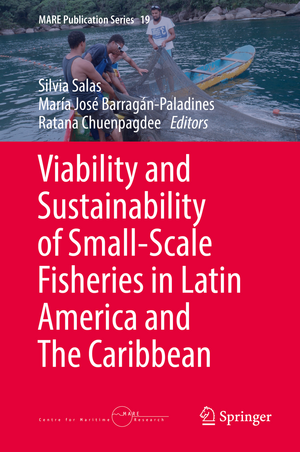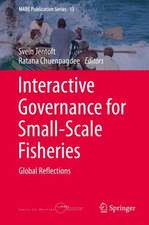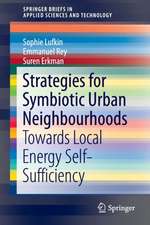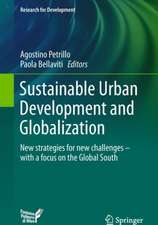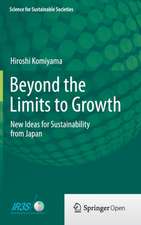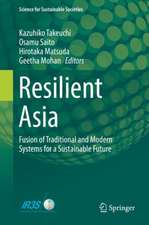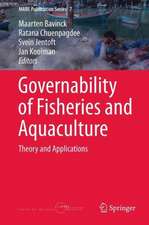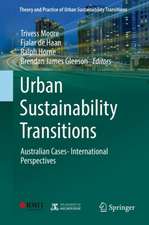Viability and Sustainability of Small-Scale Fisheries in Latin America and The Caribbean: MARE Publication Series, cartea 19
Editat de Silvia Salas, María José Barragán-Paladines, Ratana Chuenpagdeeen Limba Engleză Hardback – 22 iun 2018
This important book illustrates the complexity, diversity, and dynamics of small-scale fisheries in the Latin American and Caribbean region and presents experiences, tools, and approaches to lead towards sustainable and viable fisheries. The reader will gain a new understanding on the range of actions, approaches, and information needed for their successful management.
John F. Caddy, International Fisheries Expert
This book, prepared by the Too Big To Ignore partnership, constitutes a very valuable resource for policy makers, fisheries scientists, non-governmental organizations, civil society organizations, and fishing communities interested in putting in place sound management strategies, research, and actions to contribute to the sustainability of small-scale fisheries and food security in Latin America and the Caribbean region.
Juan Carlos Seijo, Professor of Fisheries Bioeconomics at Marist University of Merida
| Toate formatele și edițiile | Preț | Express |
|---|---|---|
| Paperback (1) | 698.46 lei 38-44 zile | |
| Springer International Publishing – 26 ian 2019 | 698.46 lei 38-44 zile | |
| Hardback (1) | 805.92 lei 3-5 săpt. | |
| Springer International Publishing – 22 iun 2018 | 805.92 lei 3-5 săpt. |
Din seria MARE Publication Series
-
 Preț: 432.33 lei
Preț: 432.33 lei -
 Preț: 408.16 lei
Preț: 408.16 lei - 24%
 Preț: 754.96 lei
Preț: 754.96 lei -
 Preț: 401.79 lei
Preț: 401.79 lei -
 Preț: 397.38 lei
Preț: 397.38 lei - 23%
 Preț: 701.41 lei
Preț: 701.41 lei - 18%
 Preț: 727.97 lei
Preț: 727.97 lei -
 Preț: 284.93 lei
Preț: 284.93 lei - 24%
 Preț: 918.28 lei
Preț: 918.28 lei - 15%
 Preț: 645.79 lei
Preț: 645.79 lei - 18%
 Preț: 974.98 lei
Preț: 974.98 lei - 20%
 Preț: 511.78 lei
Preț: 511.78 lei -
 Preț: 388.90 lei
Preț: 388.90 lei - 19%
 Preț: 553.61 lei
Preț: 553.61 lei -
 Preț: 388.31 lei
Preț: 388.31 lei - 23%
 Preț: 757.23 lei
Preț: 757.23 lei - 18%
 Preț: 887.86 lei
Preț: 887.86 lei - 15%
 Preț: 645.47 lei
Preț: 645.47 lei -
 Preț: 391.99 lei
Preț: 391.99 lei - 15%
 Preț: 650.37 lei
Preț: 650.37 lei
Preț: 805.92 lei
Preț vechi: 982.82 lei
-18% Nou
Puncte Express: 1209
Preț estimativ în valută:
154.21€ • 161.02$ • 127.34£
154.21€ • 161.02$ • 127.34£
Carte disponibilă
Livrare economică 26 martie-09 aprilie
Preluare comenzi: 021 569.72.76
Specificații
ISBN-13: 9783319760773
ISBN-10: 3319760777
Pagini: 540
Ilustrații: XVII, 574 p. 94 illus., 50 illus. in color.
Dimensiuni: 155 x 235 mm
Greutate: 1.13 kg
Ediția:1st ed. 2019
Editura: Springer International Publishing
Colecția Springer
Seria MARE Publication Series
Locul publicării:Cham, Switzerland
ISBN-10: 3319760777
Pagini: 540
Ilustrații: XVII, 574 p. 94 illus., 50 illus. in color.
Dimensiuni: 155 x 235 mm
Greutate: 1.13 kg
Ediția:1st ed. 2019
Editura: Springer International Publishing
Colecția Springer
Seria MARE Publication Series
Locul publicării:Cham, Switzerland
Cuprins
Part 1. Introduction.- Chapter 1. Big Questions About Sustainability and Viability in Small-Scale Fisheries.- Chapter 2. Overview of Small-Scale Fisheries in Latin America and the Caribbean: Challenges and Prospects.- Part 2. Issues Challenges and Threats.- Chapter 3. Adaptive Capacity to Coastal Disasters: Challenges and Lessons from Small-Scale Fishing Communities in Central-Southern Chile.- Chapter 4. Small-Scale Fisheries on the Pacific Coast of Colombia: Historical Context, Current Situation and Future Challenges.- Chapter 5. Cooperation, Competition and Attitude Towards Risk of Small-Scale Fishers as Adaptive Strategies: The Case of Yucatan, Mexico.- Chapter 6. Drivers of Adaptive Capacity to Climate Change in Coastal Fishing Communities of Tabasco, Mexico.- Part 3. Monitoring Management and conservation.- Chapter 7. From Fishing Fish to Fishing Data: The Role of Artisanal Fishers in Conservation and Resource Management in Mexico.- Chapter 8. Assessing and Managing Small-Scale Fisheries in Belize.- Chapter 9. Exclusive Fishing Zone for Small-Scale Fisheries in Northern Chocó, Colombia: Pre- and Post-Implementation.- Chapter 10. The Challenge of Managing Amazonian Small-Scale Fisheries in Brazil.- Chapter 11. Moving From Stock Assessment to Fisheries Management in Mexico: The Finfish Fisheries From the Southern Gulf of Mexico and Caribbean Sea.- Part 4. Socio-Economic, Markets and Livelihoods.- Chapter 12. Socio-Economic Monitoring for Sustainable Small-Scale Fisheries: Lessens from Brazil, Jamaica, and St. Vincent and the Grenadines.- Chapter 13. Values Associated With Reef-Related Fishing in the Caribbean: A Comparative Study of St. Kitts and Nevis, Honduras, and Barbados.- Chapter 14. The Contribution of Small-Scale Fisheries to Food Security and Family Income in Chile, Colombia, and Peru.- Chapter 15. Seafood Supply Chain Structure of the Fishing Industry of Yucatan, Mexico.- Chapter 16. Analyzing Fishing Effort Dynamics in a Multispecies Artisanal Fisheryin Costa Rica: Social and Ecological System Linkages.- Chapter 17. The Embrace of Liwa Mairin: Lobster Diving and Sustainable Livelihoods on the Nicaraguan Miskitu Coast.- Part 5. Communities, Stewardship, and Governance.- Chapter 18. Collaborative Coastal Management in Brazil: Advancements, Challenges and Opportunities.- Chapter 19. Where Small-Scale Fisheries Meet Conservation Boundaries: MPA Governance Challenges in Southern Brazil.- Chapter 20. Supporting Enhancement of Stewardship in Small-Scale Fisheries: Perceptions of Governance Among Caribbean Coral Reef Fishers.- Chapter 21. Existing Institutional and Legal Framework and Its Implications for Small-Scale Fisheries Development in Brazil.- Chapter 22. Exploring the Governability of Small-Scale Fisheries in Ecuador and Galapagos Islands Under the “Buen Vivir” Principle.- Part 5. Conclusions.- Chapter 23. Drivers and Prospects for the Sustainability and Viability of Small-Scale Fisheries in Latin America and the Caribbean.
Textul de pe ultima copertă
One of the main goals in fisheries governance is to promote viability and sustainability in small-scale fishing communities. This is not an easy task given external and internal pressure, including environmental change and competition with other economic sectors searching for development in the coastal region. A comprehensive understanding of small-scale fisheries in their own context, and from a regional perspective, is an important step in supporting the implementation of the Voluntary Guidelines on Securing Sustainable Small-Scale Fisheries (SSF Guidelines). This book contributes to the global effort by offering knowledge, insights and lessons about small-scale fisheries in Latin America and the Caribbean. The 20 case studies included in the book make explicit the various dimensions that are intrinsic to small-scale fisheries in the region, and identify conditions and situations that affect the wellbeing of fishing communities. The book offers insights regarding the challenges faced by small-scale fisheries in the region, and, aligning with the objectives of the SSF Guidelines, provides lessons and experiences about how to make small-scale fishing communities viable while maintaining sustainable fisheries.
This important book illustrates the complexity, diversity, and dynamics of small-scale fisheries in the Latin American and Caribbean region and presents experiences, tools, and approaches to lead towards sustainable and viable fisheries. The reader will gain a new understanding on the range of actions, approaches, and information needed for their successful management.
John F. Caddy, International Fisheries Expert
This book, prepared by the Too Big To Ignore partnership, constitutes a very valuable resource for policy makers, fisheries scientists, non-governmental organizations, civil society organizations, and fishing communities interested in putting in place sound management strategies, research, and actions to contribute to the sustainability of small-scale fisheries and food security in Latin America and the Caribbean region.
Juan Carlos Seijo, Professor of Fisheries Bioeconomics at Marist University of Merida
This important book illustrates the complexity, diversity, and dynamics of small-scale fisheries in the Latin American and Caribbean region and presents experiences, tools, and approaches to lead towards sustainable and viable fisheries. The reader will gain a new understanding on the range of actions, approaches, and information needed for their successful management.
John F. Caddy, International Fisheries Expert
This book, prepared by the Too Big To Ignore partnership, constitutes a very valuable resource for policy makers, fisheries scientists, non-governmental organizations, civil society organizations, and fishing communities interested in putting in place sound management strategies, research, and actions to contribute to the sustainability of small-scale fisheries and food security in Latin America and the Caribbean region.
Juan Carlos Seijo, Professor of Fisheries Bioeconomics at Marist University of Merida
Caracteristici
Covers a variety of small-scale fisheries issues in different contexts, from Islands to the continent, offering a wide range of themes that are being discussed by government and non-governmental organizations Case studies offer lessons learned in terms of vulnerability concerns, market dynamics, social capital and institutional and legal frameworks of SSF, which is a priority for many countries in LAC and worldwide; contributing therefore to the implementation of the SSF Guidelines in the region Contributors to the book are experts and specialists from different disciplines within the Latin America and the Caribbean region who have an extensive experience working in the region
